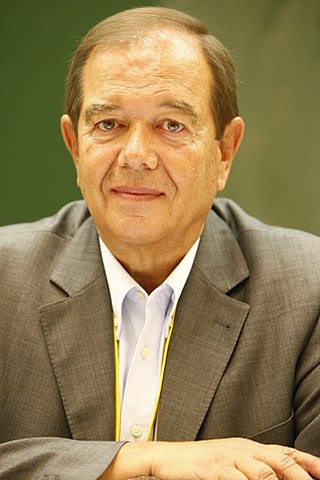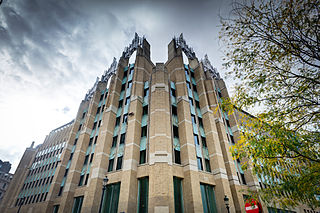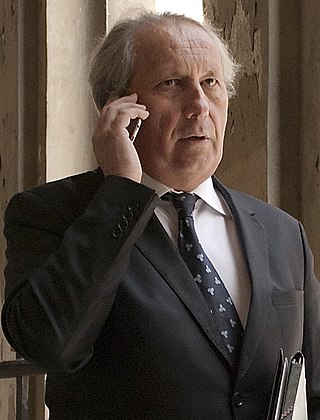
Fluxys is a Belgium-based company, mainly acting as a natural gas transmission system operator. In 2004, it employed around 850 people and its infrastructure comprised about 3,700 km (2,300 mi) of pipelines and a terminal in Zeebrugge, Belgium. The company is listed on Euronext Brussels market.

Électricité de France SA, commonly known as EDF, is a French multinational electric utility company owned by the government of France. Headquartered in Paris, with €139.7 billion in sales in 2023, EDF operates a diverse portfolio of at least 120 gigawatts of generation capacity in Europe, South America, North America, Asia, the Middle East, and Africa.
Suez S.A., known from 1997 to 2001 as Suez-Lyonnaise des eaux, was a leading French multinational corporation headquartered in the 8th arrondissement of Paris, with operations primarily in water, electricity and natural gas supply, and waste management. Suez was the result of a 1997 merger between the Compagnie de Suez and Lyonnaise des Eaux, a leading French water company. In the early 2000s Suez also owned some media and telecommunications assets, but later divested them. According to the Masons Water Yearbook 2004/5, Suez served 117.4 million people around the world. The company conducted a merger of equals with fellow utility company Gaz de France on 22 July 2008 to form GDF Suez. The water and waste assets of Suez were spun off into a separate publicly traded company, Suez Environnement.

Electrabel SA is a Belgian energy corporation. It is a subsidiary of French multinational utility company Engie S.A..

Patrick Ollier is a French politician. He is the Mayor of Rueil-Malmaison. He was a national assembly deputy for Hauts-Alpes's 2nd constituency from 1988 to 2002, as a member of the UMP. Secondly for Hauts-de-Seine's 7th constituency from 2002 to 2017. He was briefly the President of the National Assembly in 2007. He is the partner of Michèle Alliot-Marie, Minister of Foreign and European Affairs in the government of François Fillon.

The Penly Nuclear power station is found some 6 miles (10 km) northeast of Dieppe. It lies on the border of two French municipalities: Penly and Saint-Martin-en-Campagne in the département of Seine-Maritime, Normandy, on the English Channel coast. It employs France's only working funicular railway in industrial use.

Engie SA is a French multinational utility company, with its headquarters in La Défense, Courbevoie, which operates in the fields of electricity generation and distribution, natural gas, nuclear, renewable energy, and petroleum. It is active in both upstream and downstream activities.

The MEGAL pipeline is a major natural gas pipeline system in southern Germany. It transports natural gas from the Czech–German and Austrian–German borders to the German–French border.

Luminus is the second largest electricity producer and energy supplier on the Belgian energy market. Its main shareholder is Électricité de France with a 68.6% stake.
Distrigas was a natural gas company based in Belgium. In addition to Belgium, the company operated also in France, the Netherlands and Germany. On 1 November 2012, Distrigas merged with Nuon Belgium and became Eni Gas & Power NV/SA, a wholly owned subsidiary of Eni.

The EDF-GDF tower is an office building built in 1974 in the heart of the new town of Cergy, France, in the Cergy Prefecture business and administrative district.

The Compagnie Nationale du Rhône is a French electricity generation company, mainly supplying renewable power from hydroelectric facilities on the Rhône.

Agence des participations de l'État, created in 2004 under the government of Jean-Pierre Raffarin, is the French agency responsible for managing the State's shareholdings in companies of strategic importance. As of 2022, APE has €732.514 billion worth of assets under management, which includes investments in companies involved in energy, industry, defence, transport, communication and finance, among others.
Stéphane Courbit is a French businessman in the sector of media and television.

Matthieu Pigasse is a French investment banker, media mogul and investor. He previously served as Lazard's Global Head of Mergers and Acquisitions and Sovereign Advisory, as well as CEO of Lazard France. He currently serves as head of Centerview Partners in France.

Jean-Michel Carboni is a French Chief Executive Officer, senior official and senior executive in the energy sector, for EDF-GDF, Gaz de France and Engie groups. Member of the management committee he is Deputy CEO of Engie in 2013.
Engie IT or Engie Information & Technologies is the IT subsidiary of Engie energy group launched in 2010 by senior executive Jean-Michel Carboni. Engie IT's revenue in 2013 amounted to €600 million.
Eni Gas & Power France S.A. is the first French natural gas company, based in Paris and founded by Taoufik Tahar, Robert Delbos and Jean-Paul George in 2003.
Jean-Paul George is a French Chairman and CEO of the energy sector. He is known as co-founder and Chairman of Altergaz, the first French independent natural gas company, created in 2003.
The electricity market in France comprises the organizational forms of the electricity production and marketing sector, which has been undergoing a process of economic liberalization since the late 1990s.














